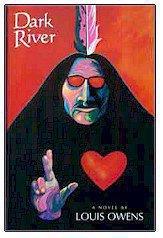
IN MEMORY OF LOUIS OWENS ON THE THIRD ANNIVERSARY OF HIS PASSING (1948-2002)
Louis, if you're reading this from some place else, please forgive me for saying that you were the coolest professor of literature I ever had. Maybe it's just my dorky whiteness speaking. But it is mine, and it comes here to pay homage to you, to bear witness to what you meant to me.
I remember your quiet poise in the classroom, intense yet receptive, warm. I remember some of your white shirts and mellow, worn blue jeans. For years now, as I wandered the department stores each August looking for a new shirts and pants to start the new semester, I've always thought that maybe I'd find a white shirt like yours. With the right pair of jeans, and some brown shoes, maybe I could communicate the quiet peace that enveloped me when I was in your presence. I didn't look for the nice, thin ties and dark silk shirts of the other male professors I had; I thought of your strong arms coming through white sleeves, solid and confident, true like the bark of a tree. Although I only took one course with you, you really stayed with me. You came to symbolize the quiet strength I thought I might embody some day.
Around 2001, I began thinking about you in earnest, more consciously. I had made the "big time" as a professor at Famous U and was working on a project that would finally bring my scholarship into the stream of the Native American Studies you introduced me to. I wondered how you would react to having me reappear and ask you for advice. If all went well with our preliminary contact via email, I would come for a visit at the University of New Mexico to say hi and show you what I was doing. I wanted to show you how far I had come since you last saw me.
For these reasons, I could not believe you ended your own life. I could not fathom how such darkness could touch your life, much less control it and bring it to an end. Although I hardly knew you, and hardly had the right to stake a claim on the grief of your friends and family, I felt like you had let me down.
From time to time, I see that some students come to admire me. They construct me in their minds in ways I'll never really appreciate or understand. I feel the love and it's a great feeling that's a part of the ebb and flow of my year-to-year life as an academic. Yet, they misunderstand me as much I misunderstood you, Louis. They don't really know who I am, they only know the parts of me that shine through when I teach: the thrill of the intellectual chase, the humor, the energy. They know me as a leader, a role model, a symbol for something. And that thing may have nothing to do with me when I am at home alone, in the dark, thinking about my life and what it can do, what it wants and what it cannot do. They don't know my true dark and my true light.
In spite of this natural and universal disjunction, I wish you had found a way to channel all of the love and respect your students had for you into an affirmation of your own life-force. But through your obituaries and homages I've learned that your life was much fuller and more interesting than what I had imagined, even as I idolized you in my own frivolous way. If there was dark that I could not fathom, there were also reservoirs of light I had not imagined either.
Louis, as the anniversary of your death nears this week (How could I forget? Sadly, it's on my birthday), I want to say that I still remember you. I'm not thin enough for white shirts to look so good on me, and I haven't quite found the right shirt to be honest. But I've dumped most of the dockers for good in favor of jeans. I still believe in you and cherish the memory of your thoughtful, warm gaze. And I believe in words, like you did with so much passion, even if, for one terrible moment, you forgot to do so, and left us behind.
Rest in Peace Professor.

This post is in memory of Professor Louis Owens (1948-2002), who was one of the brightest lights in Native American Literature. Owens was also an accomplished novelist and essayist with numerous books to his name. Owens' last collection of essays is I Hear the Train: Reflections, Inventions, Refractions, and Jacquelyn Kilpatrick has just edited the book Louis Owens Literary Reflections on His Life and Work.

